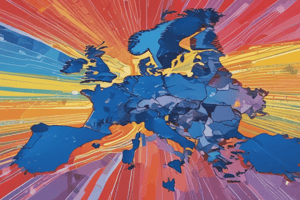Podcast
Questions and Answers
Who are the primary bodies responsible for creating EU laws?
Who are the primary bodies responsible for creating EU laws?
- European Commission and European Parliament
- Council of the European Union and European Commission
- European Parliament and Council of the European Union (correct)
- European Council and European Parliament
What is the default method for passing EU laws?
What is the default method for passing EU laws?
- Conciliation
- Ordinary legislative procedure (correct)
- Joint decision-making
- Election by citizens
Which institution represents the citizens of the EU in the lawmaking process?
Which institution represents the citizens of the EU in the lawmaking process?
- European Parliament (correct)
- Council of the European Union
- European Council
- European Commission
What is the purpose of a conciliation committee in the EU lawmaking process?
What is the purpose of a conciliation committee in the EU lawmaking process?
Which institution is composed of the member states' governments?
Which institution is composed of the member states' governments?
What power does the European Parliament (EP) have in the EU lawmaking process?
What power does the European Parliament (EP) have in the EU lawmaking process?
What is the main role of the European Commission in the EU legislative process?
What is the main role of the European Commission in the EU legislative process?
Which procedure involves the European Parliament either approving or rejecting a proposed law?
Which procedure involves the European Parliament either approving or rejecting a proposed law?
What is the primary goal of EU legislation?
What is the primary goal of EU legislation?
What is the role of the Court of Justice of the European Union (CJEU) in the EU legislative process?
What is the role of the Court of Justice of the European Union (CJEU) in the EU legislative process?
Which of the following is NOT a purpose of EU legislation?
Which of the following is NOT a purpose of EU legislation?
Why is understanding the EU legislative process essential for anyone interested in EU affairs?
Why is understanding the EU legislative process essential for anyone interested in EU affairs?
Flashcards are hidden until you start studying
Study Notes
Union Legislative: A Deeper Dive into EU Lawmaking
In the European Union (EU), laws are created not by a single entity, but through a collaborative process involving multiple institutions. This article will guide you through the complex yet intriguing world of Union legislative affairs, focusing on EU legislation.
The European Parliament and the Council of the European Union: Shaping EU Laws
The primary bodies responsible for creating EU laws are the European Parliament (EP) and the Council of the European Union (COEU). The EP represents the citizens of the EU, while the COEU is composed of the member states' governments. Both institutions have the power to pass legislation, either through joint decision-making or through a process known as the ordinary legislative procedure.
Ordinary Legislative Procedure: The Core of EU Lawmaking
The ordinary legislative procedure, also known as codecision, is the default method for passing EU laws. It involves the following main steps:
- The European Commission (EC) proposes legislation.
- The EP and the COEU exchange their opinions through a series of readings and amendments.
- A conciliation committee, consisting of an equal number of members from the EP and the COEU, is formed to resolve differences between the two institutions.
- The final text is approved by both the EP and the COEU.
The EP can reject the proposed legislation at any stage of the process, forcing the EC to reconsider or revise its proposals.
Special Legislative Procedure: A Narrower Path
In certain cases, the EU uses a special legislative procedure to enact laws. This procedure has two main forms:
- Cooperation procedure: The EP and the COEU exchange opinions, without the need for a conciliation committee. The law is then adopted by the COEU.
- Assent procedure: The EP either approves or rejects a proposed law.
The European Commission: Proposing EU Legislation
The EC plays a central role in initiating the legislative process. It proposes laws based on the policy priorities agreed upon by the EU heads of state and government. Once a proposal is made, it is submitted to the EP and the COEU for approval.
The EU Courts: Ensuring the Rule of Law
The Court of Justice of the European Union (CJEU) is responsible for interpreting EU law and ensuring that member states comply with EU rules. The CJEU plays a crucial role in maintaining the integrity and effectiveness of EU legislation.
EU Legislation: Creating Harmony in Diversity
EU legislation aims to protect the rights of citizens, businesses, and member states. By harmonizing laws across the EU, the union promotes fair competition, consumer protection, and the free movement of goods, services, capital, and people.
In conclusion, the EU legislative process is a complex and collaborative effort involving multiple institutions. Understanding this process is essential for anyone interested in EU affairs, as it provides an insight into how laws are created, debated, and approved. The EU's legislative framework has been instrumental in promoting unity and cooperation among its member states, ensuring that the benefits of EU membership are felt by all citizens.
Studying That Suits You
Use AI to generate personalized quizzes and flashcards to suit your learning preferences.



